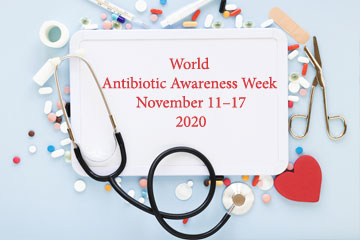
Antibiotics are antimicrobial drugs that are used to suppress and treat bacterial infections. Antibiotic resistance occurs when germs develop the ability to resist the drugs produced to kill them. The World Health Organization (WHO) defines the problem as follows: “Antibiotic resistance occurs when bacteria change in response to the use of these medicines. Bacteria, not humans or animals, become antibiotic-resistant.”
World Antibiotic Awareness Week is an annual campaign observed November 11–17 to raise awareness about antibiotic resistance and to encourage best practices on the use of these medicines.
When bacteria or other microbes get the ability to resist the effects of the antibiotic designed to destroy them, the bacteria survive and transfer their medication resistant properties to other bacteria and create more harm. The infections caused by antibiotic resistant germs are difficult and often impossible to treat.
It is normal and expected that bacteria develop resistance to a medication, but it is the way medications are used that affects how quickly and to what extent resistance occurs. According to Centers for Disease Control and Prevention, antibiotic use of up to one-third to one-half in humans is inappropriate or unnecessary.
Antibiotic resistance leads to more serious illness, longer recovery, more doctor visits, higher medical costs, longer hospital stays, and increased mortality rate. This problem is rising dangerously in all parts of the world. New resistance mechanisms are developing and spreading globally, threatening our ability to treat common infectious diseases. The emergence and spread of resistance get worse when antibiotics can be bought for human or animal use without a prescription. For example, in some countries, antibiotics are sometimes prescribed by healthcare workers or veterinarians without standard treatment guidelines and over-used by public.
Antibiotics can treat only bacterial infections, not viral infections. For instance, antibiotics can be used to treat strep throat caused by the bacterium Streptococcus pyogenes, but cannot be used to treat common viral infections such as flu (influenza), cold, stomach flu, bronchitis, some sinus infections, most coughs, some ear infections.
Ways to prevent infections and to fight antibiotic resistance:
- Avoid overuse of antibiotics. Taking antibiotics when they are not the appropriate treatment will result in antibiotic resistance over time.
- Avoid self-medication with antibiotics.
- Never use leftover antibiotics from previous treatments or buy them online or from a pharmacy without a prescription.
- Never share your leftover antibiotics with others.
- If you are prescribed an antibiotic, do not stop taking the medicine when you start feeling better. Full treatment is needed to kill the disease-causing bacteria. If you fail to take the full course of the prescribed medication, you will have to resume the treatment and this may make the harmful bacteria develop antibiotic-resistant properties.
- Don’t pressure your doctor to give you antibiotics if you are unwell as these medicines don’t work in every case. Follow your doctor’s guidance on treating your symptoms.
- Maintain good hygiene.
- Keep your family’s vaccinations up to date.
- Avoid close contact with sick people.
- Include foods in your diet that have been produced without the use of antibiotics.
- Wash your hands, separate raw and cooked food, cook foods properly to the right temperature to kill harmful bacteria, and chill food properly.
Appropriate use of antibiotics, called antibiotic stewardship, can help extend the lifespan of current antibiotics, avoid side effects, protect from antibiotic-resistant infections, and preserve the effectiveness of current antibiotics.